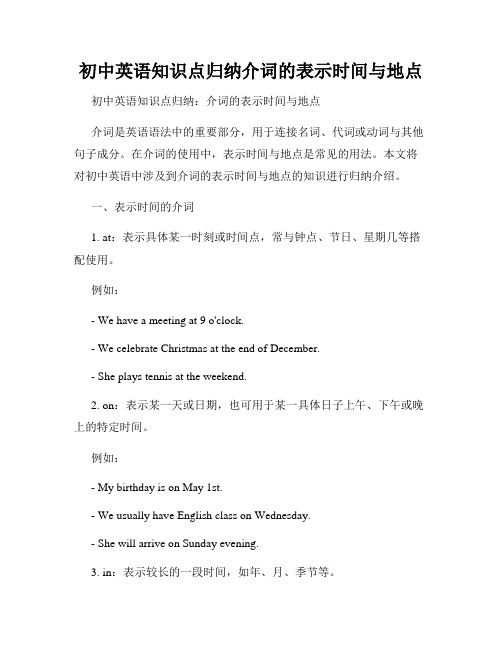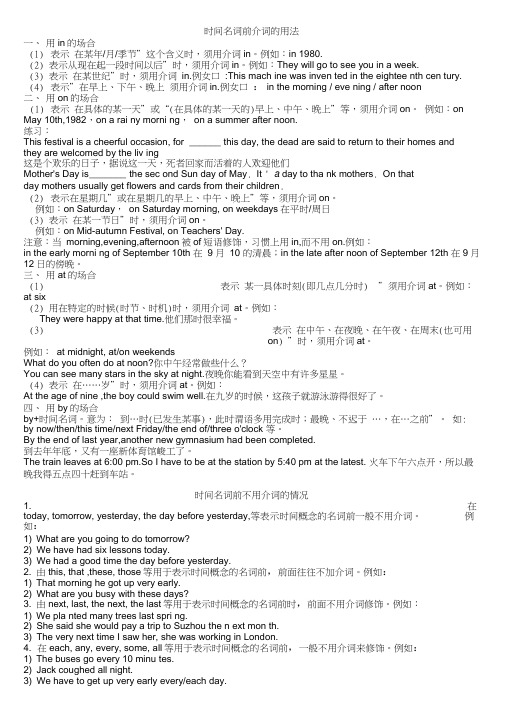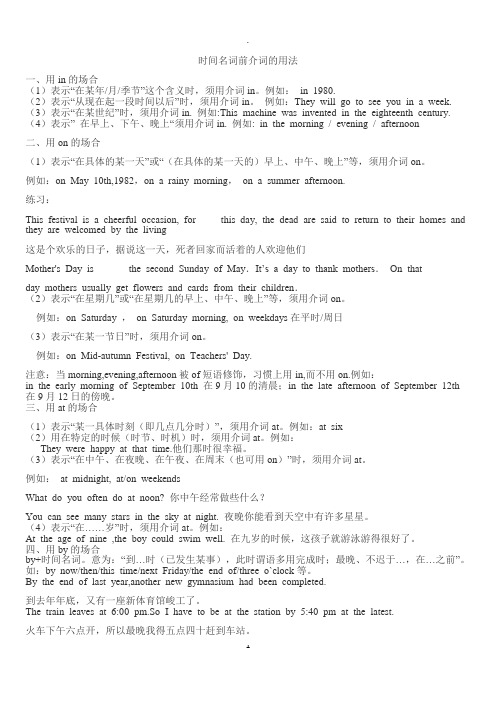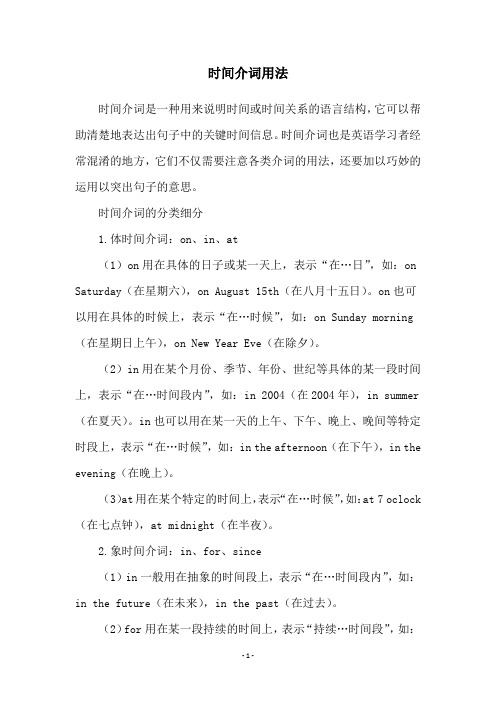英语中时间的各种介词搭配
时间前面的介词用法

时间名词前所用介词的速记歌年月周前要用in,日子前面却不行。
遇到几号要用on,上午下午又是in。
要说某日上下午,用on换in才能行。
午夜黄昏须用at,黎明用它也不错。
at也用在明分前,说“差”可要用上to,说“过”只可使用past,多说多练牢牢记,莫让岁月空蹉跎。
下面就时间概念的介词用法做一简要介绍和比较。
1.at表示时间概念的某一个点。
(在某时刻、时间、阶段等)。
at 1:00(dawn,midnight,noon)在一点钟(黎明、午夜、中午)These are our chief tasks at the present stage.这些就是我们现阶段的主要任务。
2.on1)表示具体日期。
They arrived in shanghai on May 25.他们在五月二十五日到达上海。
注:(1)关于"在周末"的几种表示法:at(on)the weekend 在周末---特指at(on)weekends 在周末---泛指over the weekend 在整个周末during the weekend 在周末期间(2)在圣诞节,应说"at Christmas?而不说"on Christmas?2)在(刚……)的时候。
On reaching the city he called up his parents.一到城里他就给父母打了一个电话。
3.in1)表示"时段"、"时期",在多数情况下可以和during互换,前者强调对比,后者强调持续。
in(during)1988(December,the 20th century)在一九八八年(十二月、二十世纪)I returned to Beijing in the middle of June.我是六月中回北京的。
但如果表示"在某项活动的期间",则只能用during。
初中英语知识点归纳介词的表示时间与地点

初中英语知识点归纳介词的表示时间与地点初中英语知识点归纳:介词的表示时间与地点介词是英语语法中的重要部分,用于连接名词、代词或动词与其他句子成分。
在介词的使用中,表示时间与地点是常见的用法。
本文将对初中英语中涉及到介词的表示时间与地点的知识进行归纳介绍。
一、表示时间的介词1. at:表示具体某一时刻或时间点,常与钟点、节日、星期几等搭配使用。
例如:- We have a meeting at 9 o'clock.- We celebrate Christmas at the end of December.- She plays tennis at the weekend.2. on:表示某一天或日期,也可用于某一具体日子上午、下午或晚上的特定时间。
例如:- My birthday is on May 1st.- We usually have English class on Wednesday.- She will arrive on Sunday evening.3. in:表示较长的一段时间,如年、月、季节等。
例如:- I was born in 2005.- He will go to Canada in the summer.- They always go skiing in January.4. during:表示在某一段时间内。
例如:- I read a book during the summer vacation.- They have a party during the New Year's holiday.5. for:表示持续的一段时间。
例如:- I have been learning English for five years.- They will stay in the hotel for a week.二、表示地点的介词1. in:表示在一个较大的范围或区域内。
英语中时间名词前介词的用法

时间名词前介词的用法一、用in的场合(1)表示在某年/月/季节”这个含义时,须用介词in。
例如:in 1980.(2)表示从现在起一段时间以后”时,须用介词in。
例如:They will go to see you in a week.(3)表示在某世纪”时,须用介词in.例女口:This mach ine was inven ted in the eightee nth cen tury.(4)表示”在早上、下午、晚上须用介词in.例女口: in the morning / eve ning / after noon二、用on的场合(1)表示在具体的某一天”或“(在具体的某一天的)早上、中午、晚上”等,须用介词on。
例如:on May 10th,1982,on a rai ny morni ng,on a summer after noon.练习:This festival is a cheerful occasion, for ______ this day, the dead are said to return to their homes andthey are welcomed by the liv ing这是个欢乐的日子,据说这一天,死者回家而活着的人欢迎他们Mother's Day is _______ the sec ond Sun day of May. It ' a day to tha nk mothers. On thatday mothers usually get flowers and cards from their children.(2)表示在星期几”或在星期几的早上、中午、晚上”等,须用介词on。
例如:on Saturday,on Saturday morning, on weekdays在平时/周日(3)表示在某一节日”时,须用介词on。
英语中时间名词前介词的用法

时间名词前介词的用法一、用in的场合(1)表示“在某年/月/季节”这个含义时,须用介词in。
例如:in 1980.(2)表示“从现在起一段时间以后”时,须用介词in。
例如:They will go to see you in a week. (3)表示“在某世纪”时,须用介词in. 例如:This machine was invented in the eighteenth century. (4)表示” 在早上、下午、晚上“须用介词in. 例如: in the morning / evening / afternoon二、用on的场合(1)表示“在具体的某一天”或“(在具体的某一天的)早上、中午、晚上”等,须用介词on。
例如:on May 10th,1982,on a rainy morning,on a summer afternoon.练习:This festival is a cheerful occasion, for ____this day, the dead are said to return to their homes and they are welcomed by the living这是个欢乐的日子,据说这一天,死者回家而活着的人欢迎他们Mother's Day is ______the second Sunday of May.It’s a day to thank mothers.On thatday mothers usually get flowers and cards from their children.(2)表示“在星期几”或“在星期几的早上、中午、晚上”等,须用介词on。
例如:on Saturday ,on Saturday morning, on weekdays在平时/周日(3)表示“在某一节日”时,须用介词on。
例如:on Mid-autumn Festival, on Teachers' Day.注意:当morning,evening,afternoon被of短语修饰,习惯上用in,而不用on.例如:in the early morning of September 10th 在9月10的清晨;in the late afternoon of September 12th 在9月12日的傍晚。
时间介词用法

时间介词用法时间介词是一种用来说明时间或时间关系的语言结构,它可以帮助清楚地表达出句子中的关键时间信息。
时间介词也是英语学习者经常混淆的地方,它们不仅需要注意各类介词的用法,还要加以巧妙的运用以突出句子的意思。
时间介词的分类细分1.体时间介词:on、in、at(1)on用在具体的日子或某一天上,表示“在…日”,如:on Saturday(在星期六),on August 15th(在八月十五日)。
on也可以用在具体的时候上,表示“在…时候”,如:on Sunday morning (在星期日上午),on New Year Eve(在除夕)。
(2)in用在某个月份、季节、年份、世纪等具体的某一段时间上,表示“在…时间段内”,如:in 2004(在2004年),in summer (在夏天)。
in也可以用在某一天的上午、下午、晚上、晚间等特定时段上,表示“在…时候”,如:in the afternoon(在下午),in the evening(在晚上)。
(3)at用在某个特定的时间上,表示“在…时候”,如:at 7 oclock (在七点钟),at midnight(在半夜)。
2.象时间介词:in、for、since(1)in一般用在抽象的时间段上,表示“在…时间段内”,如:in the future(在未来),in the past(在过去)。
(2)for用在某一段持续的时间上,表示“持续…时间段”,如:for three days(持续三天),for five minutes(持续五分钟)。
(3)since一般用在某一个具体的时间点上,表示“自从…起”,如:since yesterday(自从昨天起),since 2005(自从2005年起)。
时间介词的运用当我们希望表达某段时间时,可以利用上述介词细分类别中的介词,如将“昨天晚上”表达为“on yesterday evening”,将“1993年至1996年”表达为“from 1993 to 1996”,将“两个小时”表达为“for two hours”,将“1700年以来”表达为“since 1700”等等。
时间前面介词的用法

时间前面介词的用法
在时间前面,通常会使用以下介词:
1. at:用于具体的时刻或准确的时间点,例如at 8 o'clock(在8点钟),at noon(在中午)。
2. in:用于表示年、月、季节、十年,以及大部分情况下的某个段时间,例如in 2022(在
2022年),in May(在五月),in winter(在冬天),in the 1990s(在20世纪90年代)。
3. on:用于特定的日期、周几、假日以及某些节日,例如on January 1st(在1月1日),on Saturday(在星期六),on Christmas Day(在圣诞节)。
4. before:表示在某时间之前,例如before 9 am(在早上9点之前)。
5. after:表示在某时间之后,例如after 6 pm(在晚上6点之后)。
6. during:表示在某个期间或事件发生期间,例如during the summer(在夏天期间)。
7. until/till:表示一直到某个时间,例如until/till tomorrow(直到明天)。
需要注意的是,具体使用哪个介词取决于具体的时间表达方式,有时也需要根据上下文来确定。
表示时间介词用法
5. 动词to be的过去时 P177
*动词to be的过去时的构成 肯定句 否定句 I was… I was not… You were… You were not… He/She/It was… He/She/It was not… We/They were… We/They were not… 一般疑问句 简略回答 Was I…? Yes, I was. No, I wasn’t. Were you…? Yes, we were. No, we weren’t. Was he/she/it…? Yes, he/she/it was. No, he/she/it wasn’t. Were we…? Yes, we were. No, we weren’t. Were they…? Yes, they were. No, they weren’t.
They will have dinner together 源自n Sunday evening.
注意:具体某天的上午、下午或晚上要用介词on,如:
My children play in the street in the daytime. (在白天) I can hear the cars at night. (在晚上) I go to my mother’s house at the weekend. (在周末) I go to my mother’s house on the weekend.(美式英语) I play tennis at weekends. (每逢周末) Do the EX. on P166.
2. 疑问词
Who, whom, whose, which, what, where, when, why, how(how many, how much, how old, how long, how far, how often, how soon, how big) Who---主格 Who is he? Whom---宾格 Whom do you talk with? Whose---定语 Whose book is this? Which---哪个,哪些(有限定的选择范围) Which museum do you want to go to? What --什么,什么样的(没有限定的选择范围) What does Jim often do on Monday?
英语中表示时间的介词
5. I remember Susan left _____a very cold morning of January.
A. in
6. We don’t go to school _____Sundays.
A. on
B. in C. at
D. with
7. Mr. Smith taught English in China ______1997.
on June 1st ,on the morning of July 2 3)morning, afternoon, evening, night, day前有描绘性修饰语 时与on连用;
on that evening, on a cold night, on that day 4)表示周年纪念日;
练习:
1. The story happened ______the evening of August 2.
介词短语的常见搭配与含义
介词短语的常见搭配与含义介词短语是英语中常用的短语结构,由介词加上一个宾语构成。
它在句子中起到修饰名词、动词、形容词等成分的作用,能够增加句子表达的复杂性和准确性。
介词短语的常见搭配和含义对于英语学习者来说至关重要。
本文将介绍一些常见的介词短语搭配及其含义,以帮助读者更好地掌握和运用这一语法结构。
一、表示时间的介词短语:1. At + 特定时间:表示具体的某一时刻,例如"at 8 o'clock"(在8点)或"at noon"(在中午)。
2.In + 时间段:表示某一段时间,例如"in the morning"(在早上)或"in July"(在七月)。
3.On + 具体日期或星期几:表示某一具体日期或星期几,例如"on August 1st"(在8月1日)或"on Sunday"(在星期日)。
二、表示地点的介词短语:1. In + 具体地点:表示在某个范围或区域内,例如"in the park"(在公园里)或"in China"(在中国)。
2. At + 具体地址或地点:表示在某个特定的地址或地点,例如"at 123 Main Street"(在123号主街)或"at the cinema"(在电影院)。
3. On + 具体道路、街道等:表示在某个具体的道路或街道上,例如"on Oxford Street"(在牛津街上)或"on the highway"(在公路上)。
三、表示原因的介词短语:1. Because of + 名词或代词:表示由于某个原因,例如"Because of the rain"(因为下雨)或"Because of him"(因为他)。
(完整版)英语中时间名词前介词的用法
时间名词前介词的用法一、用in的场合(1)表示“在某年/月/季节”这个含义时,须用介词in。
例如:in 1980.(2)表示“从现在起一段时间以后”时,须用介词in。
例如:They will go to see you in a week. (3)表示“在某世纪”时,须用介词in. 例如:This machine was invented in the eighteenth century. (4)表示” 在早上、下午、晚上“须用介词in. 例如: in the morning / evening / afternoon二、用on的场合(1)表示“在具体的某一天”或“(在具体的某一天的)早上、中午、晚上”等,须用介词on。
例如:on May 10th,1982,on a rainy morning,on a summer afternoon.练习:This festival is a cheerful occasion, for ____this day, the dead are said to return to their homes and they are welcomed by the living这是个欢乐的日子,据说这一天,死者回家而活着的人欢迎他们Mother's Day is ______the second Sunday of May.It’s a day to thank mothers.On thatday mothers usually get flowers and cards from their children.(2)表示“在星期几”或“在星期几的早上、中午、晚上”等,须用介词on。
例如:on Saturday ,on Saturday morning, on weekdays在平时/周日(3)表示“在某一节日”时,须用介词on。
例如:on Mid-autumn Festival, on Teachers' Day.注意:当morning,evening,afternoon被of短语修饰,习惯上用in,而不用on.例如:in the early morning of September 10th 在9月10的清晨;in the late afternoon of September 12th 在9月12日的傍晚。
- 1、下载文档前请自行甄别文档内容的完整性,平台不提供额外的编辑、内容补充、找答案等附加服务。
- 2、"仅部分预览"的文档,不可在线预览部分如存在完整性等问题,可反馈申请退款(可完整预览的文档不适用该条件!)。
- 3、如文档侵犯您的权益,请联系客服反馈,我们会尽快为您处理(人工客服工作时间:9:00-18:30)。
英语中时间的各种介词搭配有没有困扰你?来学习一下英语时间的几种表达方法及搭
配吧!
1.多少年,多少天以前,用这个词“ago”, 比如说,三年以前:three years ago. 几星期
以前, weeks ago, 一个半月以前:one month and a half ago,下面,我们来看几个例句:I bumped into my ex-boyfriend days ago. 我几天前无意间撞见了我的前男友。
Marry dropped out of school months ago. 玛丽几个月前辍学了。
We settled down in New York 2 weeks ago. 两星期前我们在纽约定居下来。
2.多少年,多少天以后,用介词“in”,如:几年后:in years, in a couple of years, 5个
月后:in 5 months, 10天后:in 10 days:
I’ll let you know our final decision in a week. 一个星期后,我会通知你我们的最后决定。
We’re moving to Guangzhou in 2 days. 两天后,我们就要搬去广州了。
如果你喜欢自己慢慢淘,那就婉拒热心的店员:
I'm just browsing.
I'm just looking.
我只是随便看看。
如果你是忙到连逛街时间都没有的人,那就讨好店员吧:
Could you help me pick up a dressy dress?
可以帮我选一条美美的礼服吗?
时尚界人士教导我们任何衣服都要亲自试穿:
May I try this on?
我可以试穿这件吗?
Where is the fitting room?
试衣间在哪里?
买衣服买的不就是“适合自己”吗:
Does this style look good on me?
这件我穿好看吗?
Does this make me look fat?
我穿这件是不是看起来看胖?
It fits me like a glove.
这件衣服太有我的范儿了。
It's not my size.
这不是我的号码(太大或太小)。
I don't like too much cleavage. My mom will kill me if she sees too much cleavage. 我不喜欢太暴露的衣服。
我妈要是看到我穿的太暴露会杀了我的。
特别需要关注:
What materials is this skirt made of?
这条裙子是什么料子的?。
